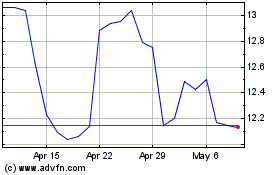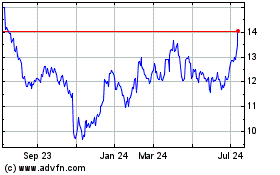By Christina Rogers and Jeff Bennett
The United Auto Workers union reached a tentative labor deal
with Fiat Chrysler Automobiles NV that will eventually remove a
controversial two-tier wage system that pays newer hires less than
more-experienced co-workers doing the same jobs, according to
people familiar with the agreement.
Under the current arrangement, newer factory employees earn
about $9 an hour less than more senior employees, a point of
friction for many rank-and-file workers. The new structure will
eventually phase out the two classes of wages over time, the people
said.
Pay for entry-level workers hired after 2007 is currently capped
at $19.28 an hour. The new deal would raise that pay ceiling after
a number of years closer to $25 an hour, the people said, though
the precise time frame and dollar amount couldn't be learned.
Veteran workers earning more will keep their wages until they no
longer work for the company, leaving the other wage as the new pay
standard for auto workers going forward, the people said.
Fiat Chrysler Chief Executive Sergio Marchionne and UAW
President Dennis Williams discussed the pact at a news conference
in Detroit Tuesday evening, but declined to disclose specific wage
details. UAW leaders will likely brief members on highlights in
coming days.
Mr. Marchionne said bargainers have "crafted a very careful
process by which the [tier-wage] system will go away."
For decades, the Detroit Three's auto workers made the same
wage. But the UAW in 2007 agreed to a contentious new wage
structure that paid new hires much less in an effort to aid the
auto makers during a period of financial distress. The fortunes at
the Detroit auto makers were squeezed in part by increased
competition from foreign rivals such as Toyota Motor Corp., which
enjoyed lower labor costs.
Union and Fiat Chrysler leaders several times said the new deal
addresses rising health-care costs, which Mr. Marchionne
characterized as a costly component of hourly-worker
compensation.
"Health care was an important piece of this contract," Mr.
Marchionne said. "I think we have an obligation to manage a better
way. There are built-in inefficiencies of how health care is run
today."
Mr. Williams has pushed for a health-care purchasing pool that
would represent roughly one million active workers and blue-collar
retirees and use its size to win cost savings from medical
providers. It wasn't clear whether the new deal features such a
pool.
The Detroit car makers, which combined will spend more than $2
billion on health care this year, say medical expenses have been
growing at an unsustainable rate.
Mr. Williams said his aim was to reach a deal that would
increase pay, reward members for sacrifices and address escalating
health-care costs.
Company and union negotiators bargained through the night and
all day Tuesday, hoping to hammer out a template the union hopes
can be used for later talks with General Motors Co. and Ford Motor
Co., the other two Detroit car companies.
Union leaders will now send the deal to the rank-and-file
members for a ratification vote. Fiat Chrysler has about 36,000
U.S. hourly workers represented by the UAW.
The UAW hopes GM and Ford will use the deal with Fiat Chrysler
as a guide when they head to the negotiating table. Mr. Williams
sought to allay concerns that the UAW might not win better terms
from those more-profitable companies.
"The FCA contract doesn't have to be an identical pattern," Mr.
Williams said. "I don't want people to think for one minute that I
am not looking at the other companies and what they have made. Each
company has unique operations. What we have here for FCA doesn't
mean we will have the same thing for GM and Ford."
In a statement, GM said: "We are pleased the UAW and FCA
negotiating teams have reached a tentative agreement and are eager
to continue discussions with our union partners."
In its statement, Ford said: "We look forward to negotiating a
fair and competitive labor agreement that enables us to continue
providing jobs and investment here in the U.S."
GM and Ford extended their contracts Monday, awaiting a
resolution at Fiat Chrysler. Workers at all three Detroit car
makers will continue to operate under the terms of their 2011
agreement until a new deal can be completed.
The two sides had been bargaining for months, often working late
nights and weekends, trying to reach a new multiyear agreement for
the UAW's 140,000 hourly workers at GM, Ford and Fiat Chrysler.
With all three auto makers earning healthy profits and U.S.
new-vehicle sales on track to eclipse 17 million for the first time
since 2001, the UAW's Mr. Williams is under pressure to win pay
raises for senior workers who haven't received an increase in a
decade.
Hourly workers at Fiat Chrysler have also received much less in
profit-sharing bonuses than their counterparts at GM and Ford, a
disparity that has rankled many members.
Fiat Chrysler is the smallest and least profitable of the
Detroit Three car makers. With about 45% of its hourly workforce
earning the lower wage, the company has a labor cost advantage of
about $9 to $10 an hour over rivals GM and Ford, putting it more on
par with Asian rivals such as Toyota.
UAW leaders picked Fiat Chrysler on Sunday to take the lead in
talks, an unusual move for a union that has a history of choosing
the most profitable company to settle on a contract with first.
Typically, the union goes where it can get the richest deal, hoping
it can pressure the other two companies to match it.
But Mr. Williams chose the company in part because of his unique
relationship with Mr. Marchionne, a person familiar with the matter
said. Mr. Williams has known the Italian-Canadian chief executive
for years and believed he could quickly sell a deal to GM and Ford
once hammering out an agreement with Mr. Marchionne, this person
said.
In the 2000s, Mr. Williams led the UAW's region 4, negotiating
deals at farm-equipment makers Deere & Co., Caterpillar Inc.
and CNH Industrial, the truck and tractor manufacturer spun off
from Fiat's automotive business four years ago. Mr. Marchionne is
now board chairmanat CNH Industrial.
Mr. Marchionne has said since the start of talks in July he
would lead the final negotiations and has been vocal about
eliminating the two-tier wage structure, calling the inequity in
pay and the division it created among workers unsustainable over
the long-run. Executives at GM and Ford haven't publicly stated
their position on the wage scale.
Mr. Marchionne canceled his appearance at the Frankfurt Motor
Show this week to focus on bargaining, which took place at a UAW
training center in Detroit.
Winning membership support for the deal could prove challenging
for union leadership. Some factory workers were baffled by UAW
leaders' decision to go with Fiat Chrysler first, worried they
would end up with a weaker deal than if the union negotiators had
started with GM or Ford.
"Naturally we're not very optimistic about [Fiat] Chrysler being
chosen, " said Austen Keown, 26, an assembly-line worker at Ford's
Louisville, Ky., plant. "They're the least profitable."
During the last round of talks in 2011, Chrysler workers were
split on the contract with the skilled-trade group--representing a
small number of the total workforce--rejecting the tentative deal.
Then-UAW President Bob King was forced to step in and declare the
contract ratified since most workers approved it.
Write to Christina Rogers at christina.rogers@wsj.com and Jeff
Bennett at jeff.bennett@wsj.com
Subscribe to WSJ: http://online.wsj.com?mod=djnwires
(END) Dow Jones Newswires
September 15, 2015 23:36 ET (03:36 GMT)
Copyright (c) 2015 Dow Jones & Company, Inc.
Ford Motor (NYSE:F)
Historical Stock Chart
From Mar 2024 to Apr 2024

Ford Motor (NYSE:F)
Historical Stock Chart
From Apr 2023 to Apr 2024
